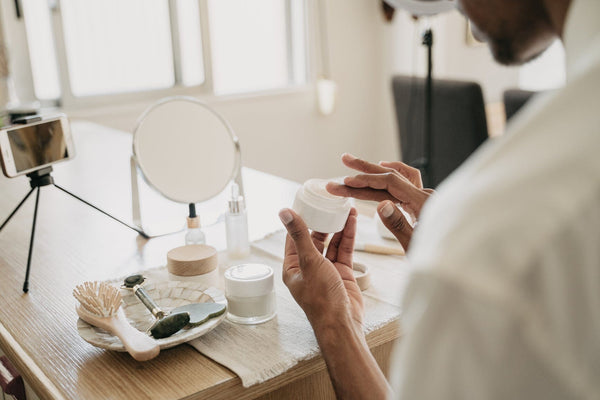You know the old saying, “there are only a few guarantees in life...” and I’m not talking about death and taxes. I’m referring to menopause and vaginal atrophy, more commonly referred to as or vaginal dryness, and its associated symptoms of burning, irritation and painful sex. The sooner we accept these truths, the better prepared we will be to actively manage what often takes us by surprise, and in this case it’s vaginal atrophy. Proactively addressing these symptoms can help maintain a happy vagina during menopause and beyond.
Early Signs of Vaginal Atrophy in Menopause
Unlike menopausal hot flashes and night sweats, which will eventually cease, vaginal changes due to diminished estrogen production during menopause are chronic and progressive over time, if left untreated. The signs of vaginal atrophy during menopause often include an unpleasant and constant “awareness of their vagina”. Women typically suffer with gradual and worsening vulvar and vaginal symptoms including dryness, irritation, itching, pain and bleeding during sex, as well as proneness to infection and urinary complaints.
The medical term for these uncomfortable symptoms is Genitourinary Syndrome of Menopause (GSM), which includes vaginal atrophy and vaginal dryness. Anyone in menopause is at risk, but complaints are typically more intense and more sudden in onset, especially in those women who smoke, those with breast cancer undergoing chemotherapy or taking anti-estrogen medications and in those who have had their ovaries removed before natural menopause.
Can You Reverse Vaginal Atrophy?
While vaginal atrophy can be chronic and progressive, there are options available to heal, hydrate and renew thinning vaginal tissue, restoring comfort and tissue elasticity.
Enter, hyaluronic acid; a naturally occurring super moisturizer. It is found in nature, as well as is naturally occurring in the body, and can retain up to 1,000 times its weight in moisture. It has been used for years both safely and effectively in the dermatology, anti-aging, cosmetic and orthopedic realms.
Bonafide’s Revaree® is a solid, easy to use, mess and applicator-free insert placed vaginally every 2-3 days, ideally at bedtime. Revaree is easily inserted manually with your fingers into the vagina with the rounded edge first. The insert dissolves at body temperature in approximately 30 minutes. Women typically report improvement in symptoms of atrophy in just 9 days and research confirms these findings. Revaree is best used regularly, since it won’t be long after discontinuing use that those miserable symptoms of vaginal atrophy will quickly recur. Trust me!
Unlike with other vaginal creams where “what goes up must come down…” women will not notice the same mess or copious discharge after using Revaree. Some women have reported a minute oily droplet in the toilet upon awakening; but rest assured, this is not unusual and is nothing to worry about. In rare situations, women have reported a burning sensation with initial use; the vast majority notice this quickly resolves. As with any new product, if burning or irritation persists or worsens, use should be discontinued and a visit with your gynecologist is in order. It’s important to remember that some women might be initially sensitive to ingredients.
Hormone Therapy – Can It Reverse Vaginal Atrophy?
In addition to hormone-free management options, like Revaree, systemic estrogen therapy or minimally absorbed vaginal estrogen are standard treatment options that can be considered for the management of vaginal atrophy. Topical vaginal estrogen typically comes in the form of creams, tablets, inserts, suppositories, or rings. These types of prescription products are designed to resupply estrogen and help to restore mucosal cells, aiding in replenishing moisture to dry, vaginal tissues. Not everyone is a candidate for estrogen-based therapies, so it’s important to speak with your healthcare provider first to determine what treatment options are best for you based off your personal medical history.
What Else Can Contribute to Symptoms of Vaginal Atrophy?
Keep in mind, when it comes to using feminine hygiene and bath products during menopause, less is more. Harsh fragrances can irritate the delicate genital and vulvar tissues. Douches are definitely not recommended since the vaginal pH can be disrupted alongside use and lead to infection. Fun fact: the vagina has its own mechanisms to keep itself clean and pH balanced therefore vigorous scrubbing or cleansing on the inside is just not necessary.
The Role of Blood Flow in Vaginal Atrophy and Its Symptoms
Less estrogen means less blood flow to the vagina, and less blood flow contributes to vaginal atrophy. The solution? Try to incorporate more sexual activity. Sexual arousal and orgasm, whether partnered or solo, can work to enhance blood flow to the genitals and aid in maintaining a healthy vagina.
Take Proactive Steps to Keeping Your Vagina Happy
Now is the opportune moment to ask ourselves, isn’t it time to take an active, or better yet, a proactive role in maintaining our vaginal health? Remember, vaginal atrophy is treatable. We know menopause is a fact of life; so, bring it on! Vaginal dryness, on the other hand? No thanks! Consider moisturizing regularly. After all, we surely would not skip our regular facial moisturizer or body lotion. Don’t forget your vagina.













Comments
Post comment6 months after a radical
Hysterectomy which put me in early surgical menopause at the age of 46 … it became the dryness and Irritation. I tried replens but it was a mess abs sir really work. I can not use any kind of HRT. I researched this and asked my Menopause specialist who gave it an ok. It’s only been two weeks and been using it every 2 days. Hopefully going forward I move to ever 3 days.
It’s a miracle. There is some burning for me after use sometimes but it stops shortly. I am single so not sexual active so can not talk on how it work with that. But I feel good and it’s no uncomfortable to go to the bathroom and wipe and more. I feel how I felt before the hysterectomy from hell. I signed up for Automatic shipping each month of the product. It’s
40 a month. First Month I got a discount though and there is a reward program too. When I look at it as I’m saving money each month because I’m not paying for HRT. So I’ll gladly take out the money to be comfortable each month
This product is an absolute miracle for me. Not only did I go through surgical menopause at age 34 (now I’m 59), but I also have Sjogren’s Syndrome which makes dryness a major, major problem for me. Intimacy was no longer satisfying, I am unable to take any type of hormone therapy so I have suffered over the years. Revaree is giving me my life back.
After having a hysterectomy almost ten years ago definitely noticing changes in my body. This product definitely works. My husband loves me unconditionally, but the responses I have been getting lady in the bedroom oh my! Thanks
I am going into my third week of trying Reveree….thank you thank you thank you!! I have already noticed a big difference. I was hesitant at first but figured what did I have to lose and I’m so glad I tried it. I will never be without it. No mess, no fuss.. if you’re on the fence, give it a try.
I feel so thankful for Reveree! This product fixed my vaginal dryness and brought me back to desire to be sexual again!! How good it is!! Thank you, thank you thank you!!!